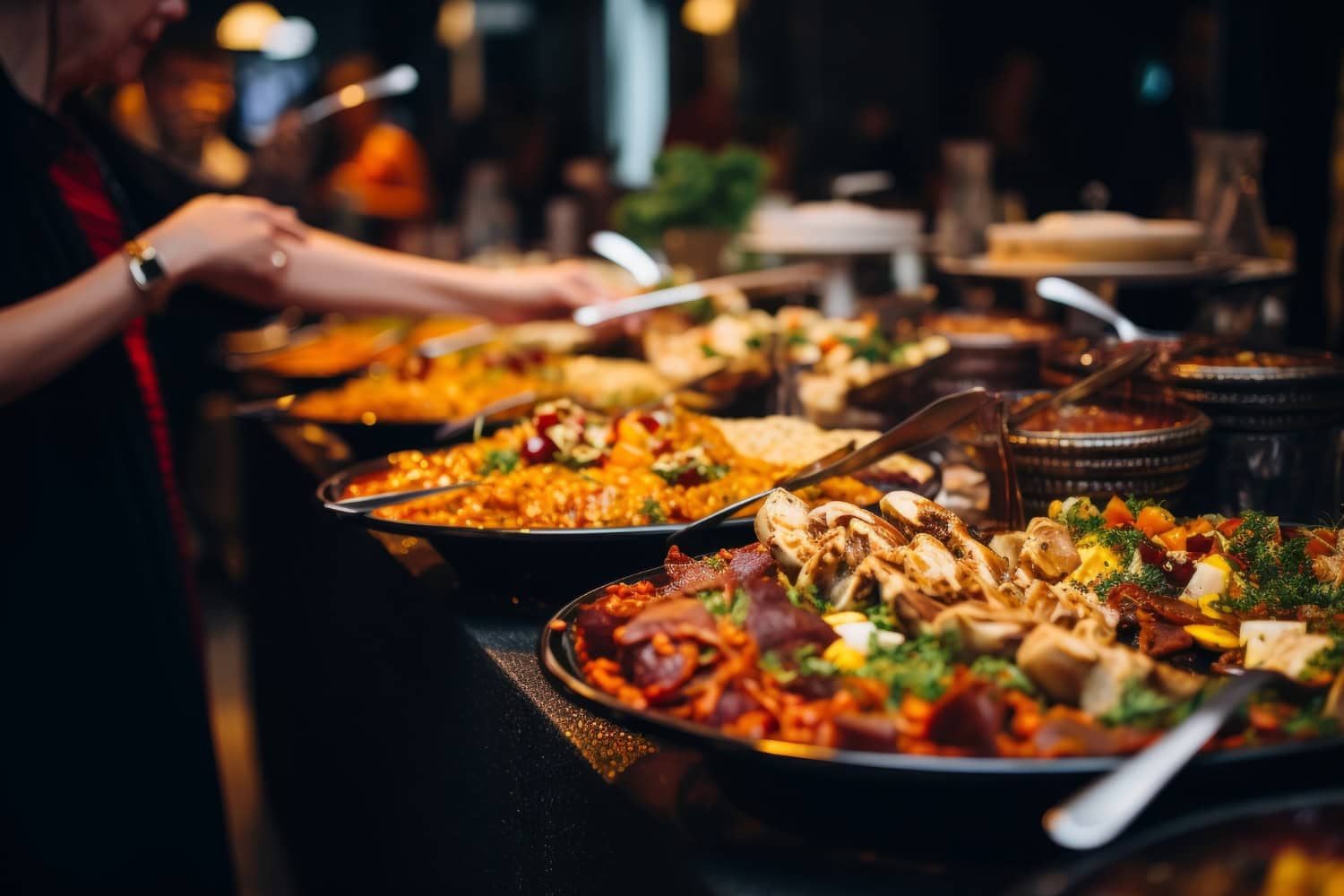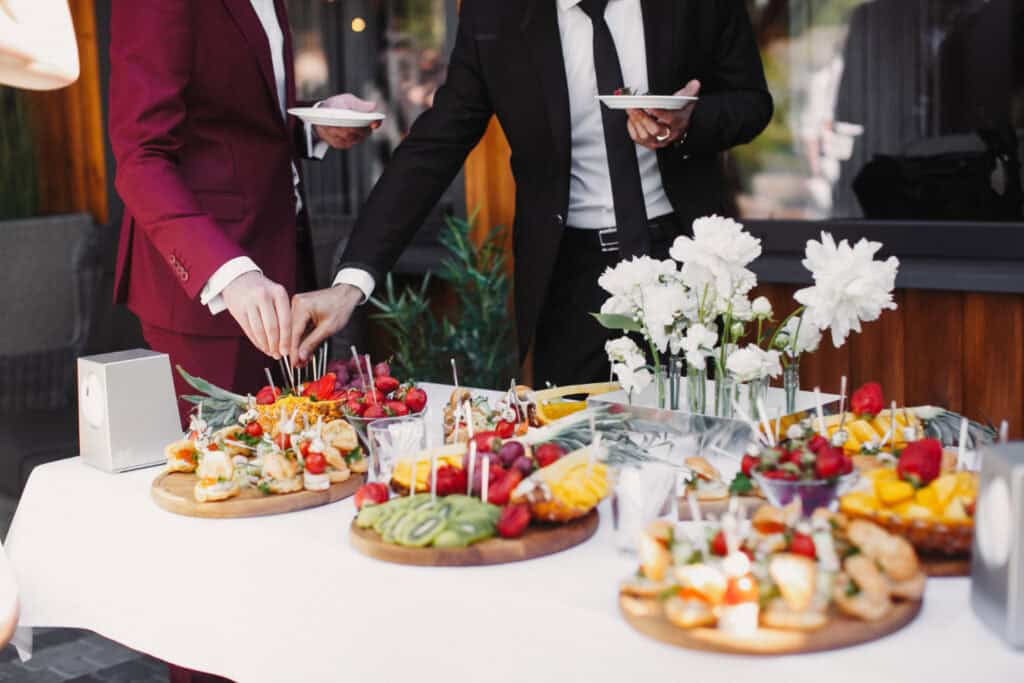
By Jermaine Thomas April 23, 2025
Food has grown in recent years from being merely a source of sustenance to becoming a statement. A growing number of people are choosing their food carefully for ethical, environmental, and lifestyle-based reasons in addition to health-related ones. This change has implications for the catering sector beyond simply providing delectable food. It involves creating menus that are influenced by lifestyle choices and show a greater understanding of cultures, diets, and values.
Understanding the Rise of Conscious Eating
Today’s diners are more informed than ever. From sustainability and animal welfare to wellness trends and cultural inclusivity, people are paying attention to how food is sourced, prepared, and served. Let’s begin by exploring what conscious eating really means and how it’s shaping modern catering expectations.
What Does It Mean to Eat Consciously?
Conscious eating is about making food choices that align with one’s values and beliefs. For some, that means choosing local and organic produce. For others, it’s about avoiding animal products or ensuring fair trade and humane treatment across the food supply chain. Caterers now need to understand that people don’t just eat with their mouths—they eat with their hearts and minds too. Menus must consider a wide spectrum of ethical and lifestyle needs to remain relevant.

The Shift in Consumer Priorities
A recent study by NielsenIQ found that nearly 73% of global consumers are willing to change their consumption habits to reduce their environmental impact. This directly affects what ends up on catered plates. People are choosing plant-based dishes over meat, opting for compostable packaging, and favoring food producers with transparent sourcing practices. For caterers, this means evolving beyond flavor and presentation. It’s about incorporating ethics into the entire menu creation process.
What Ethical Catering Really Looks Like
Ethical catering goes beyond dietary restrictions. It’s about integrity in sourcing, environmental responsibility, and inclusivity. Caterers practicing this model consider the broader impact of their menus—on people, animals, and the planet. Let’s break down what makes catering truly ethical in today’s food landscape.
Sourcing Local and Seasonal Ingredients
Reducing food miles is one of the pillars of ethical catering. Caterers can help local farmers, reduce emissions, and serve fresher, seasonal food by sourcing ingredients locally. Because menus change according to what’s growing nearby, it also promotes creativity. In addition to being environmentally friendly, local sourcing tells a tale. The dining experience is enhanced when guests are aware that their food was prepared nearby.
Reducing Food Waste
Conscious caterers are tackling food waste head-on. From using every part of an ingredient to donating leftovers and planning portions more accurately, ethical caterers are rethinking how food is managed. Composting, using edible garnishes, and offering smaller tasting portions are all creative ways to reduce excess while still delighting guests.
Fair Labor and Transparent Practices
Food ethics also extend to the human side. This includes working with suppliers who treat their workers fairly, paying kitchen staff equitable wages, and being transparent about what goes into each dish. Ethical catering is as much about people as it is about plates. Clients and event hosts increasingly want to know that the caterers they hire treat their staff with the same care they put into the food. This builds brand loyalty and long-term business relationships.
The Growing Popularity of Plant-Based Catering
What was once a niche request is now a mainstream expectation. Plant-based catering is not only in demand—it’s often the highlight of modern menus, praised for its creativity and sustainability. Let’s explore how and why plant-based options are dominating conscious catering.
Why Plant-Based Is Going Mainstream
Concerns about animal welfare, the environment, and health are pushing people to eat more plant-based foods. Even meat eaters are cutting back and adopting “flexitarian” lifestyles. Due to this change, plant-based catering is now widely used for events of all kinds, including weddings, business gatherings, and informal parties. It is now mandatory for caterers to serve well-considered, expertly prepared plant-based dishes. It’s essential to providing a menu that appeals to contemporary palates.
Creating Flavor Without Compromise
Gone are the days of boring salads as the only vegan option. Today’s plant-based catering is rich, varied, and inventive—featuring dishes like beetroot tartare, cashew cheese platters, jackfruit tacos, and mushroom wellington. The key is not just replacing meat but reimagining the menu altogether. Chefs are focusing on texture, umami, and color to ensure that plant-based meals are just as satisfying as their traditional counterparts.
Sustainability and Plant-Based Menus
Plant-based ingredients typically require fewer resources to produce. This translates into lower carbon emissions, reduced water usage, and less strain on ecosystems. As a result, plant-based catering aligns closely with eco-conscious events and sustainability-focused brands. When caterers present these benefits transparently, they build stronger trust with clients and guests who care about climate impact.
How Menus Reflect Lifestyle Choices
Beyond ethics and diet, food has become a way for individuals to express identity, culture, and wellness goals. Lifestyle-driven menus are about personalization, inclusion, and relevance. Let’s take a look at how caterers are designing menus that reflect the way people live and think.
Catering to Dietary Lifestyles and Beliefs
Guests of today’s events frequently adhere to low-FODMAP, gluten-free, dairy-free, paleo, or keto diets. Others might eat in accordance with cultural customs, religious beliefs, or sporadic fasting schedules. With lifestyle-driven menus, patrons can savor meals that suit their particular requirements without feeling excluded or needing to request special treatment. This improves customer satisfaction and establishes the caterer as thoughtful and an expert.
Labeling, Transparency, and Guest Comfort
Guests want to know what’s on their plate—where it came from, what’s in it, and how it’s prepared. That’s why clear labeling and ingredient transparency are critical parts of any lifestyle-driven menu. Simple actions like labeling dishes as vegan, gluten-free, nut-free, or halal not only avoid mishaps but also show respect. Guests feel safe, valued, and more connected to the event as a whole.
Creating Experiences, Not Just Meals
Menus today are often part of a bigger storytelling experience. Caterers are curating dishes that speak to themes like “farm-to-table,” “zero-waste,” or “cultural fusion.” For lifestyle-conscious diners, food is a form of celebration, identity, and alignment with their personal values. Lifestyle-driven menus aren’t just about what’s served—they’re about how the food fits into the broader experience of an event.
Challenges and Solutions in Ethical Catering
While the demand for ethical catering is growing, meeting that demand comes with challenges. From budget constraints to sourcing limitations, caterers often have to get creative to deliver on their promises. Here’s how to navigate these hurdles while still delivering meaningful, values-aligned service.
Balancing Cost and Ethics
It is frequently more expensive to source sustainable, organic, and local ingredients. Investing in biodegradable packaging or paying employees more also helps. Making ethical decisions could seem like a luxury to clients with limited funds. Setting priorities and communicating are the answers. Caterers can provide flexible packages, educate customers about the long-term benefits of their options, or highlight high-impact substitutions, such as using less plastic or sourcing meat from humane farms.
Sourcing Consistency
Seasonal menus and local sourcing can pose supply challenges, especially for large-scale events. Not all ingredients are available year-round, and smaller farms may struggle with volume. Caterers can address this by maintaining strong relationships with a network of producers, planning menus in advance, and training staff to adapt recipes based on availability.
Educating the Market
Not every client or guest will understand the importance of plant-based catering or compostable packaging. Some may even resist it. Caterers can gently educate through storytelling, thoughtful signage, and delicious food that speaks for itself. When guests enjoy the meal and learn something new in the process, they’re more likely to embrace conscious catering at future events.

The Future of Conscious Catering
The future of catering will be influenced by openness, creativity, and deep connections as awareness grows. A growing majority of people are becoming conscious eaters, who are altering the way that food is experienced on all levels. Here’s a look at what caterers who cater to the ethical and lifestyle-conscious market can expect in the future.
Tech-Enabled Transparency
Digital menus, QR codes, and mobile apps are making it easier for guests to access detailed ingredient lists, sourcing information, and even chef notes. This level of transparency supports ethical catering and builds trust. Expect more tech integration that allows guests to track sustainability metrics, carbon footprints, or allergen alerts in real-time.
Holistic Event Integration
Catering is becoming part of a larger event narrative. Caterers will work more closely with event planners, designers, and sustainability consultants to ensure the menu aligns with everything from decor to purpose. Lifestyle-driven menus will reflect event themes like wellness retreats, eco-conscious weddings, or cultural celebrations—turning meals into immersive experiences.
More Collaboration with Ethical Producers
As demand increases, there will be stronger collaboration between caterers and ethical producers—from regenerative farmers to plant-based innovators. Caterers who build these partnerships early will stand out as leaders in conscious hospitality. These relationships also ensure a steady supply of high-quality ingredients aligned with plant-based catering and sustainable values.
Conclusion
Creating experiences that reflect people’s values, accepting diversity, and offering alternative menu items are all important aspects of catering to conscientious eaters. Caterers have a special chance to inspire, inform, and delight, whether it is through the use of ethical catering practices, daring and inventive plant-based catering, or the creation of lifestyle-driven menus. People who embrace conscious dining will not only stay up to date, but will take the lead as the food industry continues to change. Because when people are satisfied with their food, they return for more, not just because of the taste but also because of the meal’s significance.